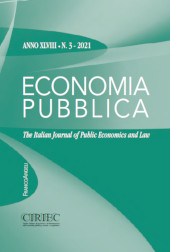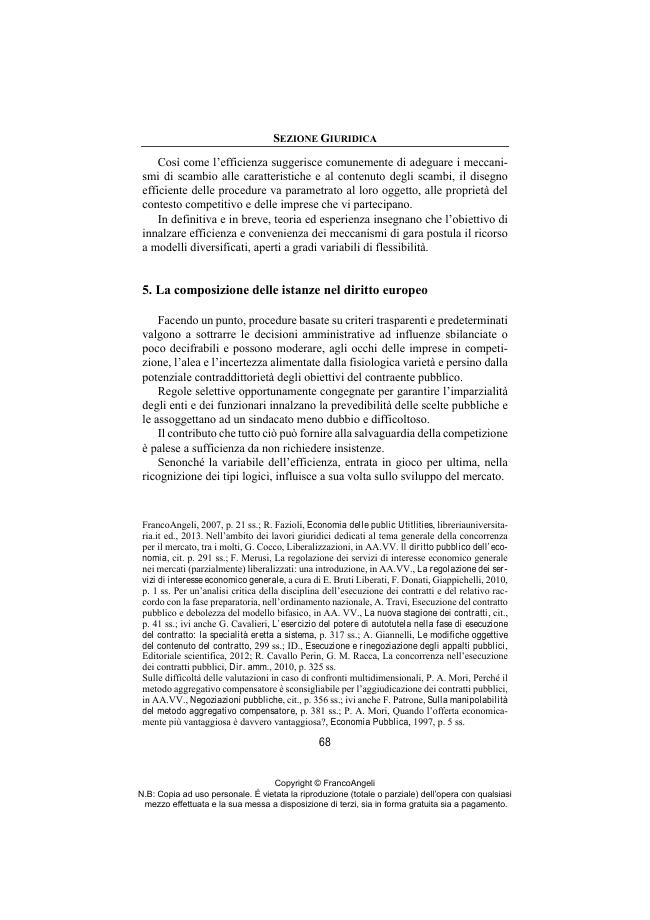2021 - Franco Angeli
Article
Digital Version
Download | Copy/paste | Printing
L'evoluzione delle procedure di gara, alla ricerca di un bilanciamento tra le ragioni dell'efficienza economica e le ragioni dell'imparzialità amministrativa
55-80 p.
- Lo scritto muove dalla constatazione che studi ed osservazioni empiriche illustrano come la disomogenea distribuzione di informazioni tra soggetti che si trovano a negoziare alimenta l'incertezza e concede spazio all'opportunismo, innalzando i costi di transazione. Calando, però, la questione strategica della mitigazione dell'opportunismo all'interno dei tre diversi ordini di rapporti chiamati in causa dalle negoziazioni pubbliche, ossia il rapporto tra pubblica amministrazione e funzionari, tra pubblica amministrazione e concorrenti e tra pubblica amministrazione e contraenti, possono affiorare delle prospettive legittime che, uscendo dalle strettoie della modellistica contabile familiare alla prassi giuridica , consentano di acquisire e sfruttare nuova informazione, in corso di gara, adattando stime e proposte e consentendo, in tal modo, di guadagnare parecchio in termini di efficienza.
- In definitiva ed in sintesi, teoria ed esperienza, che trovano ampio supporto ed ispirazione nel diritto europeo, inducono a pensare che l'obiettivo di innalzare efficienza e convenienza dei meccanismi di gara postula il ricorso a modelli diversificati, aperti a gradi variabili di flessibilità. A ben vedere il diritto europeo, assumendo il patrocinio di procedure contrattuali più aperte e di criteri di bilanciamento più flessibili, ispirati dall'idea che la stretta sorveglianza dei funzionari e delle amministrazioni non sia la finalità incondizionatamente prioritaria, accredita piuttosto l'idea che gli oneri del formalismo vadano sopportati soltanto sinché si può supporre che ne discendano benefici superiori in termini di stimolo all'intensificazione degli scambi. Lo scritto approda alla conclusione che l'efficienza vada considerata alla stregua di una variabile endogena, e non esogena, rispetto alle politiche di promozione della concorrenza.
- Onde, sarebbe utile convalidare anche nel nostro ordinamento un criterio di libertà delle forme procedimentali, almeno per i cosiddetti contratti esclusi, che non sempre e non necessariamente siano tenute a tradursi in procedure di gara, fatta salva la possibilità di accesso alla tutela giurisdizionale per l'aspirante che dimostri di aver subito gli effetti lesivi e discriminatori della violazione dei principi generali. [Testo dell'editore].
- The paper starts from the observation that studies and empirical observations illustrate how the uneven distribution of information between subjects who find themselves negotiating feeds uncertainty and allows space for opportunism, raising transaction costs. However, by lowering the strategic question of the mitigation of opportunism within the three different orders of relationships called into question by public negotiations, i.e. the relationship between public administration and officials, between public administration and competitors and between public administration and contractors, they can show the emergence of legitimate perspectives which, emerging from the bottlenecks of accounting modeling familiar to legal practice, allow the acquisition of new information, during the tender process, adapting estimates and proposals and, in this way, it is opportune to gain a lot in terms of efficiency.
- Ultimately and in synthesis, theory and experience, what a right to find support and inspiration in the European, lead us to think that the objective of achieving efficiency and advantages of the tender mechanisms postulates the use of diversified models, open to varying degrees of flexibility. If we look closely at European law, assuming the patronage of more open contractual procedures and more flexible criteria, inspired by the idea that the strict supervision of officials and administrations is not the unconditional priority, it rather accredits the idea that the formalism should only be tolerated as long as it can be assumed that there will be superior benefits in terms of stimulating the intensification of exchanges. The paper comes to the conclusion that efficiency should be considered as an endogenous, and not exogenous, variable with respect to the policies to promote competition.
- Therefore, it would be useful to validate also in our legal system a criterion of freedom of procedural forms, at least for the socalled excluded contracts, which are not always and not necessarily required to be translated into tender procedures, given the possibility of access to judicial protection for the aspirant who can prove that he has suffered the harmful and discriminatory effects of the violation of the general principles. [Publisher's text].
Is part of
Economia pubblica : XLVIII, 3, 2021-
Information
ISSN: 1972-5566
KEYWORDS
- contratti pubblici, procedure di gara, tutela della concorrenza
- public procurement, tender procedures, competition law.
-
In this issue
- Dall'armonizzazione alla standardizzazione contabile : quale via per la riforma degli ordinamenti contabili europei
- Gestione delle aziende pubbliche : dal "principe" al valore pubblico
- L'evoluzione delle procedure di gara, alla ricerca di un bilanciamento tra le ragioni dell'efficienza economica e le ragioni dell'imparzialità amministrativa
- Le limitazioni della responsabilità erariale per la gestione dell'emergenza epidemiologica tra "decreto semplificazioni" e "decreto cura Italia" : un sistema a geometria variabile
- Economie di integrazione verticale ed economie di scopo nel settore idrico e fognario : alcune considerazioni alla luce dell'evidenza empirica internazionale
- Un nuovo ruolo per consumatori, imprese e finanza nella regolazione dei settori energia-clima
- La transizione ecologica : dalle persone alle politiche e viceversa



